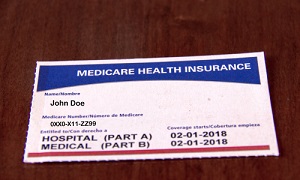It's Medicare Fraud Prevention Week - What Can You Do?

This week is Medicare Fraud Prevention Week. You probably did not even know it because of the relative lack of attention this important week has received. All the more surprising because Medicare fraud and abuse costs the government an estimated $60 billion per year. But according to Senior Medicare Patrol (SMP), the government-sponsored public education organization, there is a lot we can do to attack this perennial drain on our healthcare system.
In its own promotion of this very special week, here is what SMP says we all can do to help. Not only as Medicare beneficiaries. But also as family members, caregivers, and those employed at the hospitals, home health agencies, skilled nursing facilities, and doctor’s offices that provide the healthcare and may be committing the very fraud at issue.
What to Look For — Included among the most common areas of fraud SMP calls out are:
- Charges for medical services or equipment not actually provided.
- Misrepresenting a diagnosis; the patient or provider identity; the treatment, procedure, or equipment provided; or other facts that falsely justify payment.
- Prescribing or providing excessive or unnecessary tests, treatments, procedures, or medical equipment.
Prevent, Detect, Report! — These are the three steps SMP highlights as the best way to help the government go after healthcare fraud. And it all starts by learning how to read and understand the Medicare statements. Both the Medicare Summary Notice (MSN) and Explanation of Benefits (EOB) Medicare beneficiaries receive either in the mail or online at Medicare.gov.
- Prevent: Learn how to read the MSN and EOB by watching this SMP-created video or connecting with your local SMP.
- Detect: When reviewing the MSN or EOB, look for the red flags identified above, principally services or products the patient did not receive; duplicate charges; medically unnecessary charges; or products the doctor did not order. Using this SMP-created Health Care Tracker will help you compare what services and products the MSNs and EOBs say the patient received with what the patient actually received.
- Report: If you find any mistakes, inconsistencies, or questionable charges, call the provider for an explanation. You can also call your local SMP for guidance or the Medicare Fraud Hotline.
Who Can Help — As SMP stresses, all of us can play a hand in policing healthcare fraud.
- Family Members: Educate your loved ones on how to prevent and detect health care fraud. Encourage them to closely review their Medicare statements for mistakes or inaccuracies. Remind them to keep their Medicare number and personal information secret, never to be given out over the phone, and not to be shared with anyone other than those healthcare providers authorized to receive it. And be on the lookout for unnecessary treatments and procedures, and unused or unneeded medical supplies or products, which may have been improperly prescribed.
- Caregivers: Just like family members — especially if there are no close family members involved in the patient’s everyday care — educate the patients on how to prevent and detect fraud, encourage them to be vigilant, remind them to keep their personal information confidential, and watch for any obvious signs that unnecessary products or services have been provided.
- Health care providers: Talk to your patients about health care-related scams, such as those related to medical equipment, genetic testing, or newly issued Medicare cards. Teach them that products and services should only be ordered by doctors they regularly see, never through TV ads or unsolicited calls.
Whistleblowers are also critical to the front-line fight against healthcare fraud. They typically comprise the doctors, nurses, administrators, health aides, compliance professionals, billing personnel, medical coders, and other health care workers who witness first-hand their colleagues or organizations putting profits before patient care. Under the qui tam provisions of the False Claims Act, they are authorized to bring suit against the wrongdoers on the government’s behalf and receive up to 30% of any government recovery.
Over the past several decades, whistleblowers have been responsible for the lion’s share of government recoveries under the False Claims Act. This has resulted in tens of billions of dollars returned to the government’s Medicare and Medicaid coffers, and hundreds of millions of dollars in whistleblower rewards. Constantine Cannon attorneys have led the charge on many of these whistleblower-driven successes.
If you think you may have information relating to Medicare or Medicaid fraud, please feel free to contact us so we can connect you with a member of the Constantine Cannon whistleblower lawyer team.
Read More
- Healthcare Fraud
- Medicare Whistleblowers: The Most Common Questions Answered About Reporting Medicare Fraud
- I Think I Have a Whistleblower Case
- Contact Us Confidentially
Tagged in: FCA Federal, Healthcare Fraud, Medicare,